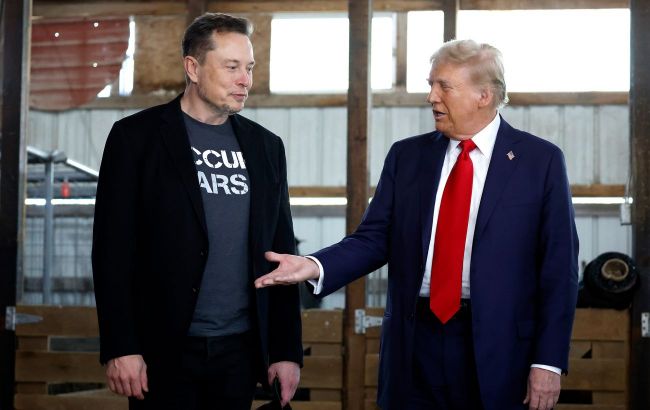Fall of Musk: How billionaire is losing influence in Trump's circle
 Elon Musk and Donald Trump (Photo: Getty Images)
Elon Musk and Donald Trump (Photo: Getty Images)
With Donald Trump's return to the White House, billionaire and visionary Elon Musk gained unprecedented influence over American politics. But now his position is increasingly weakening.
RBC-Ukraine explains why Musk is facing problems and whether they could lead to a break with Trump.
Takeaways:
- Why has Musk clashed with conservative members of Trump's team?
- How is Musk being pressured by Trump's political opponents?
- What could Musk's political future look like when he leaves the Department of Government Efficiency?
Musk's conflicts with Trump's team
Reports that Elon Musk was irritating other members of Trump's team began surfacing almost immediately after the US President's inauguration.
According to NBC sources, Musk acted like a co-president - moreover, he made sure everyone knew it. The billionaire practically never left Trump's side and even moved into his Mar-a-Lago residence.
The first serious conflict with Musk erupted last December over immigration policy.
Musk, as an entrepreneur and the founder of Tesla and SpaceX, supports bringing in skilled workers from abroad, especially in the tech sector. This position reflects his own experience as an immigrant from South Africa.
At the same time, a significant amount of Trump supporters, particularly from the conservative wing, advocate for tough restrictions on immigration, including reductions in both illegal and legal migration. Among them are Deputy White House Chief of Staff for Policy Stephen Miller, Secretary of State Marco Rubio, and Trump's advisor for trade and manufacturing Peter Navarro.
This conflict still hasn't been fully resolved. Trump's policy on migrants, despite high-profile deportations of illegals, is still being formulated. So disputes over immigration periodically spill into the public sphere and overlap with other disagreements.
Another area where Musk's interests clash with conservatives in Trump's circle is foreign trade. His company Tesla relies heavily on international suppliers, particularly from China, where key electric car components like batteries and electronics are produced. Tariffs would increase their costs, which in turn would raise production expenses in the US and potentially hurt Tesla's global competitiveness.
Musk personally tried to convince Trump to abandon new tariffs on imports from China, reports The Washington Post. However, with only partial success. Trump continues imposing new restrictions against China, but has paused the trade war against the rest of the world. Not only Musk, but the majority of American businesses oppose sharp tariff hikes. So in this case, the billionaire is acting more as their spokesperson.
Against this backdrop, a new public clash erupted between Musk and Peter Navarro - Navarro called the billionaire a "car assembler," and Musk called Trump's advisor "a moron, dumber than a sack of bricks."
Moreover, Musk’s standing was further undermined by the results of the Wisconsin Supreme Court elections. This seemingly local event caused a major stir in the US, with Musk calling the election crucial for "all of civilization" and investing over $20 million into the campaign of Republican candidate Brad Schimel - who lost to Democrat Susan Crawford, which the media named a personal defeat for Musk himself.
But far more important is that Musk has begun facing systemic problems with the American state apparatus.
Musk versus "deep state"
On Trump's team, Musk heads the Department of Government Efficiency (DOGE). In this position, he does important dirty work for Trump - purging the government apparatus. We're talking about the dismissal of hundreds of thousands of civil servants.
On one hand, this does reduce government spending and streamlines many processes. On the other - it dismantles the so-called "deep state," which for decades, through bureaucratic procedures, had blocked many of Trump's initiatives during his first presidency, while at the same time ensuring the stable functioning of the American governmental machine regardless of political upheavals.
The sometimes poorly thought-out actions of DOGE employees have led to the paralysis of certain government agencies. For example, the Consumer Financial Protection Bureau, the US Interagency Council on Homelessness, and several other government bodies have essentially ceased to function. Meanwhile, the legality of many DOGE actions is questionable and is being challenged in court.
At the same time, Musk has become a convenient target for criticism from Democrats over a series of high-profile incidents: from Nazi gestures at rallies to interference in the domestic politics of European countries.
The attack on Musk is coming from several directions. The first is public pressure. Under the #TeslaTakedown movement, activists are calling for people to sell their electric cars in order to inflict losses on one of Musk's key companies. Throughout March, protests against the billionaire's actions swept across many US states, often near Tesla dealerships. In some cases, it even came to arson.
Another line of attack concerns conflict of interest. Musk's company SpaceX holds a number of contracts with the National Aeronautics and Space Administration (NASA). Meanwhile, through DOGE activities, Musk’s people have gained access to classified data and information about SpaceX competitors, which is an obvious conflict of interest. This issue has been raised by Democratic members of the US House of Representatives.
And finally, the third line of attack is legal - and the most dangerous for Musk.
The billionaire heads DOGE as a "special government employee." According to US law, in this status, Musk can perform his duties no more than 130 days per calendar year. Though reappointment to the role is permitted. 77 Democratic congressmen sent Trump a letter on this matter.
"We urge your administration to immediately release a statement indicating that Musk will vacate his position and hand over all decision-making authority, as required by law, no later than May 30," the letter states.
What's next for Musk
According to Politico, at the end of March Trump informed his inner circle that Musk would soon leave DOGE. The billionaire himself has publicly hinted at this several times. However, it appears that Musk still maintains a good relationship with the US President.
"I don't need Elon at all, I just like him," Trump told reporters on April 10.
Overall, Musk's political future depends on several factors: the results of DOGE's work, his continued activity in the media and on social networks, and - probably most importantly - his ability to maintain close ties with Trump.
Even after a possible resignation from DOGE, Musk will still be able to use his platform X to shape political discourse, but his political weight may diminish without an official position. Likely, Musk will also use his accumulated political capital to lobby for the interests of his companies.
However, Musk’'s controversial statements and actions could damage Republicans' chances of retaining control of Congress in the 2026 midterm elections. So it's not out of the question that Trump could eventually sacrifice Musk if he becomes too much of a "burden."
Sources: statements by Donald Trump, Elon Musk, materials by NBC, Vanity Fair, The Washington Post, and Politico.

